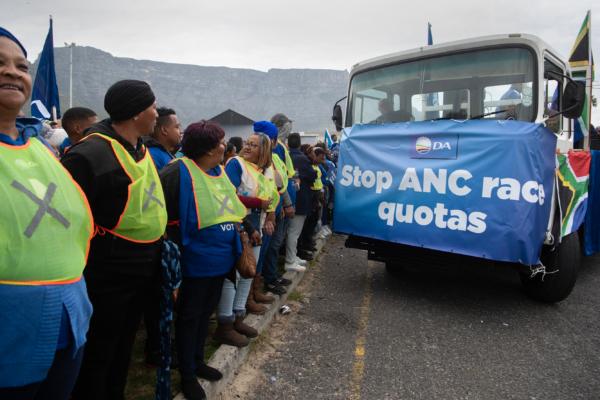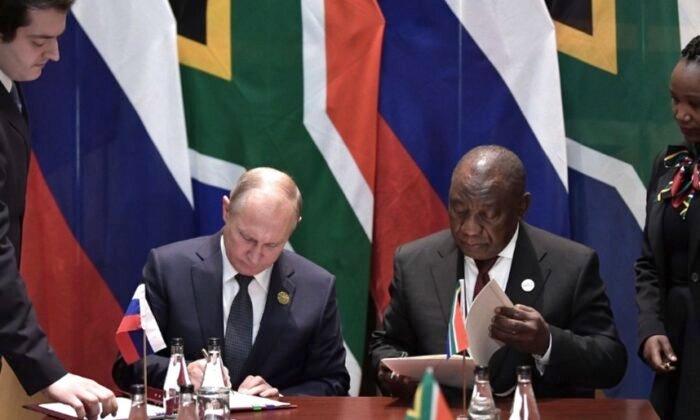ANC Veterans Leave as Key Election Approaches in South Africa
“Venal. Corrupt.”
“Responsible for plunging millions of people into poverty and hunger, and destroying entire health, security, transport, and education sectors.”
“So bad at delivering services that millions are without water and electricity every day. Nepotistic. Criminal. Selfish.”
These harsh words do not come from an opposition politician hoping to seize power from the African National Congress (ANC) when South Africa goes to the polls in May 2024. They come from Mavuso Msimang, who has been a member of the ANC since 1962 when he joined Nelson Mandela in the then-banned organization to oppose apartheid.
Mr. Mandela was jailed for treason in June 1964 until his release in early 1990, which set South Africa on the road to multiparty, multiracial democracy. In 1994, Mr. Mandela was elected president, and the ANC began governance that continues to this day.
But that rule is now facing its gravest threat, as opposition parties surge in popularity and party veterans abandon an ANC long accused of corruption, poor policymaking, and economic mismanagement. Mr. Msimang is the latest top name to walk away from the ANC. Another is Murphy Morobe, a former top official under President Thabo Mbeki. And then there are Roger Jardine, previously head of South Africa’s biggest banking group, and former President Jacob Zuma.
Disputing the Polls
In reaction, ANC spokesperson Mahlengi Bengu-Motsiri told The Epoch Times: “Obviously we’re disappointed to have lost these long-standing members. But we’re still on track to win the election next year by a large majority.”
But this is not what polls are showing. The majority indicate that the ANC will fall below the 50 percent plus one vote it needs to govern outrightly in 2024. Some surveys have the ruling party losing power altogether to a recently-formed coalition of opposition parties. For political analysts like Susan Booysen, a professor at the Wits University School of Governance in Johannesburg, it’s the loss of Mr. Zuma that will be the most damaging to the ANC.
“Zuma is the only reason why many people in KwaZulu-Natal (South Africa’s second most populous province) vote ANC,” she told The Epoch Times. “He is Zulu, like them, and despite his many indiscretions, they love him and believe that while he’s in the ANC, it represents their interests. With him gone, I have no doubt the ANC is in big trouble in Kwazulu-Natal, and also in Gauteng (province), where many Zulus live.”
Mr. Zuma, a former head of intelligence for the ANC with close ties to Russia, resigned from the party on Dec. 16. He previously had declared “lifelong” allegiance to the ANC. At a press conference, Mr. Zuma said he will be campaigning for a new organization, one that would lead South Africa to “total liberation.” He described the ANC as “utterly corrupt” and a front for “white capitalists” under current President Cyril Ramaphosa, the man who ousted him in late 2017.
Judge Raymond Zondo said the former president had helped establish a scheme known as “state capture,” appointing cronies to loot state-owned enterprises of almost $40 billion. Mr. Zuma calls Judge Zondo’s findings “ridiculous” and a “political witch-hunt” against him. Mr. Zuma is set to go on trial early next year on multiple charges of corruption, fraud, and money laundering relating to a multimillion-dollar arms deal in the 1990s.
Mr. Msimang said the ANC is “on the verge of losing power because of widely held perceptions that its members are corrupt, that the organization has a high tolerance threshold for venality, and that the deployment of unsuitable people accounts for the government’s deplorable levels of service to the public.” In South Africa, crime is spiraling, with the second-highest murder rate globally. Millions have no jobs, with an unemployment rate, when broadened to include those who have given up trying to find work, of 42 percent.
The ANC’s mismanagement of state enterprises is legendary, with ports and roads blocked with trucks because rail transport is almost non-existent. Corruption and mismanagement at Eskom, the government-run electricity corporation, are so bad that power stations are no longer capable of fulfilling South Africa’s energy needs. South Africa now suffers long, rolling blackouts every day, sparking further job losses and economic decay.
Entire towns are desolate, with ANC municipalities looting and mismanaging budgets to such a scale that there’s no money left to deliver basic services to residents and businesses.
Fiery Letter of Resignation
Mr. Msimang once used an AK-47 rifle to fight apartheid police and soldiers for the ANC’s armed guerrilla wing, Umkhonto we Sizwe (Spear of the Nation).
Now, he’s turning his guns on an organization he once considered “in my blood.” In a letter of resignation from the party sent to the ANC leadership last week, Mr. Msimang writes: “The litany of economic and social woes—crime, unemployment, destitution—associated with my beloved African National Congress is not only embarrassing but also defies enumeration.”
He went into exile in 1976 but continued to serve the ANC’s anti-apartheid cause across the globe, including in the United States, Canada, and Europe.
Mr. Msimang received a master’s degree in business administration from the U.S. International University in California before working for several global organizations, including the United Nations. He returned to South Africa in early 1994 and was one of Mr. Mandela’s first picks as a member of the country’s first democratic government. Until last week, Mr. Msimang led the ANC Veteran’s League. In his letter, he described the ANC as “wracked by endemic corruption, with devastating consequences on the governance of the country and the lives of poor people, of whom there continue to be so many.”

“As ANC leaders publicly proclaim ownership of obscenely wealthy homesteads and other possessions and send their children to the best schools in the land, there are still many South Africans whose children continue to be exposed to the risk of dropping into pit latrines in poorly equipped public schools and dying horrendous and humiliating deaths.”
Mr. Msimang accused the ANC of “disabling” the economy by instituting “business-unfriendly” policies, such as high taxation. This, he said, is causing enterprises to fail and downsize, and foreign companies not to invest in South Africa.
He added: “Inexplicably, you have ministers who attack the very private sector the President is inviting to … rebuild our economy and enable higher growth.”
Mr. Msimang said it is “unconscionable” that the ANC continues to appoint people facing criminal charges to high office, while allowing 95 senior government officials, including cabinet ministers, against whom there’s “strong evidence” of corruption and other financial crimes, to remain in their posts.
President Ramaphosa reacted to Mr. Msimang’s devastating letter by describing him as “someone who I continue to hold in the highest regard.” But other senior ANC members responded with outrage to the party veteran’s diatribe.
The president’s second-in-command in the party, Fikile Mbalula, accused Mr. Msimang of “breaking ANC culture” by publicly criticizing the party. He then suggested that Mr. Msimang had been bribed by Mr. Jardine, who last week formed a new political movement, Change Starts Now, to oppose the ANC in next year’s election.
After Mr. Msimang threatened to take legal action against Mr. Mbalula, the ANC secretary-general apologized to him and retracted his allegation.
Mr. Jardine was the youngest department director in President Mandela’s first cabinet in 1994. For the past 25 years, he’s been heading some of South Africa’s biggest private companies.
‘Withering of Democracy’
Using almost the same words as those used by Mr. Zuma to describe the ANC, Mr. Mbalula accused Mr. Jardine of opposing the ruling party as a “proxy for white monopoly capital.” Mr. Jardine, an ANC activist during apartheid, denied this, and told The Epoch Times he had decided to challenge a party he “once loved” because it is responsible for the “withering of democracy.”
He outlined a vision of building a “truly non-racial government filled with skilled technocrats and other experts in their fields … I am tired of all the nepotism and corruption associated with ANC policies.”
His colleague, Mr. Morobe, said the ANC in 1994 had promised South Africa a non-racial society. “Instead, what we have had for a long time is an ANC that’s turning South Africans against each other, an ANC that’s re-racializing the country,” said Mr. Morobe.
In local media, there is speculation that Mr. Jardine intends to put himself forward as a candidate for the presidency.
Asked by The Epoch Times if he believes that millions of South Africans are ready to vote for a president who’s not a black African, Mr. Jardine responded: “I think it’s time we tested that.”
He’s convinced that some state-owned companies and services will have to be privatized if they’re to be efficient, something that’s anathema to the ANC and its communist partners.
“I’m not saying everything needs to be privatized, but we have a very developed private sector in our country and it would be silly not to take advantage of its skills and resources,” said Mr. Jardine.
“We’re going bankrupt and services are collapsing. We have to fix the balance sheets. We need to leverage a lot of private capital.”
For Ms. Booysen, South Africa is going to change “fundamentally” in May 2024, no matter what the final results are.
“I can’t see the ANC being strong enough to win convincingly,” she said. “Either we enter a new, chaotic era of politics where the ANC governs but only with the help of a more radical coalition partner, or a new, more moderate, centrist political movement kicks the ANC out.”
Ms. Booysen said the ANC is “putting on a brave face in public” as it loses high-profile members, but ispaniching behind closed doors.
“The ANC knows it’s no longer the big bully on the block. Every month seems to herald the arrival of something new that eats at the party’s power,” she said. “The ANC is facing the most hazardous period in its existence. Its long-term survival is at stake.”
This could well be true when applied to the entire country.




